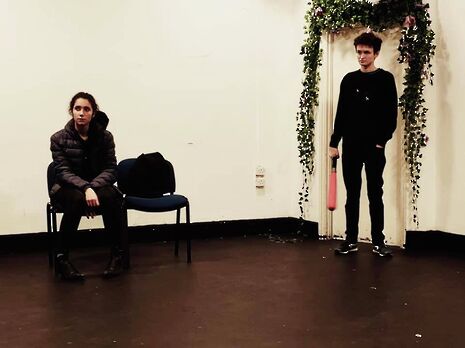A Glitch in My Code review
This sci-fi drama does not live up to the potential indicated by its subject matter, despite some good performances

A Glitch In My Code, written and directed by Anna Shmatenko, is based on an interesting premise with great potential. On the surface, it is a discussion about artificial intelligence and consciousness, but it also cleverly uses this as a platform to talk about human feelings. It explores how sometimes we can view feelings as a hindrance and often wish that we could choose to have no thoughts or feelings, but that they are, at heart, important, both the good and the bad. The writing has some good lines, a personal favourite being “if there’s one thing I know about people, it’s that they always have an opinion on themselves”. It also makes interesting points about how the desperate search for happiness can often be exploited by businesses encouraging consumerism instead of actual productivity which I find a poignant statement to be making in a world where everywhere you look is a book on mindfulness and positive thinking.
"The play needed that initial sense of normality and relatability in order for the incorporation of the abnormal to really work."
However, the writing, on the whole, was stilted and rushed creating some underdeveloped characters that left it hard to relate to the play as a whole. There was a limited sense of motivation to any of the plot developments – why did Ian get the android in the first place; why did he then want to lie to Alice about it; why did Alice taking an interest in Felix, the android, matter so much? Furthering this, the relationships between the characters, especially Ian and Alice, were basic and underdeveloped leaving the whole play off-kilter. There was barely any introduction or setting of the scene pre the arrival of Felix, no insight into Ian’s character right at the start, meaning we weren’t really interested in how the play developed – there was certainly potential here for Ian to either be really geeky and enamoured by Felix or a stuck up, posh-boy who treated Felix awfully, which could then develop throughout the play, but unfortunately this potential was not realised. There wasn’t even an element of wonder or surprise at the fact that he had a real robot in his house. I certainly felt like these components would have brought a much-needed element of humour to the play or at least a second dimension beyond its otherwise very one-dimensional plot and writing style. We had no sense of Ian being a university student or a sense of this slightly futuristic world where androids are common-place household appliances and how this must affect human society. The play needed that initial sense of normality and relatability in order for the incorporation of the abnormal and interesting Felix to really work. This was not helped by the set which was clearly trying to be a “normal, student room” but only had in it the things that were directly relevant as props, no posters on the wall or details like piles of books that would have made it feel less bare and could have helped to set up Ian’s character. A final key problem was the incredibly clunky transitions. Although it sounds like a petty comment, they broke up the flow of the play a lot and an increased efficiency, maybe with the addition of some music, would improve the overall energy.
That being said, both Lara Cosmetatos and Sophie Challonder did the best they could with the script. Challonder’s entrance onto the stage as a hectic little whirlwind of energy brought some much-needed life and provided us instantly with a bit of humanity and a character we could relate to. In contrast to this, Cosmetatos played Felix’s very placed and precise movements very well. She had lovely control, always sitting with her hands on her knees and making any gesture with the certainty and clarity that you would expect from a machine. I particularly enjoyed the “programmed” feel to the finger guns motion she performed whenever she made a joke. I would have liked to see perhaps even more strict discipline and deliberateness in her motions at the beginning and then watch develop more clearly throughout the play. I’m aware of the fact that the script discusses how human-like she is, but I felt that a stronger differentiation between Felix and Ian was a much-needed dimension in a play about androids that wasn’t really there.
On the whole, I felt that the play had a lot of potential which was unfortunately not realised. There were some solid acting performances, but the script was simply too one dimensional and rushed for any characters, relationships or the world they live in to develop with any real conviction. It did, however, bring up a lot of interesting topics and used its plot to discuss them in a manner that was poignant without seeming forced.
 Features / Should I stay or should I go? Cambridge students and alumni reflect on how their memories stay with them15 December 2025
Features / Should I stay or should I go? Cambridge students and alumni reflect on how their memories stay with them15 December 2025 News / Cambridge study finds students learn better with notes than AI13 December 2025
News / Cambridge study finds students learn better with notes than AI13 December 2025 News / Dons warn PM about Vet School closure16 December 2025
News / Dons warn PM about Vet School closure16 December 2025 News / News In Brief: Michaelmas marriages, monogamous mammals, and messaging manipulation15 December 2025
News / News In Brief: Michaelmas marriages, monogamous mammals, and messaging manipulation15 December 2025 Comment / The magic of an eight-week term15 December 2025
Comment / The magic of an eight-week term15 December 2025









